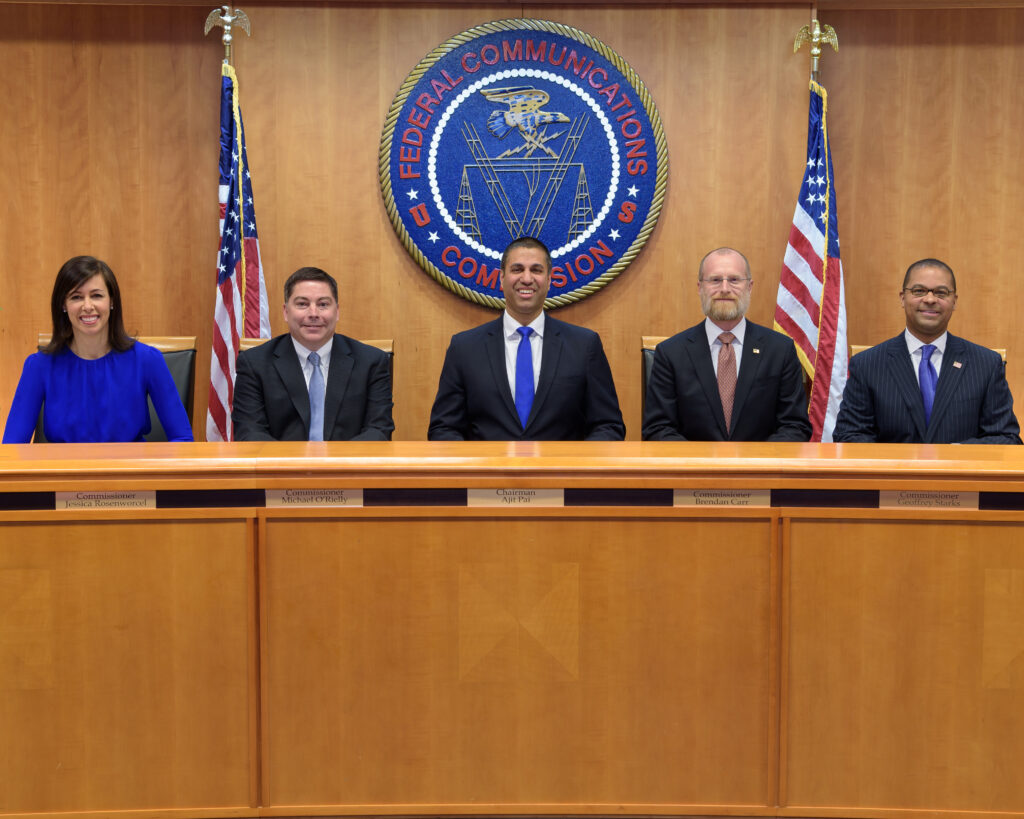
FCC Chair Ajit Pai (center), and Commissioners
UPDATED TO INCLUDE THORNBERRY COMMENT.
WASHINGTON: The FCC is shooting back at congressional criticism that it failed to review classified evidence of GPS jamming by Ligado’s planned 5G wireless network, saying: the Pentagon did not offer any such information.
In a statement to Breaking D today, a spokesperson for the beleaguered FCC said:
“The FCC is required by law to make its decision based on the facts in the record, and federal agencies, including the Department of Defense, were provided with multiple opportunities to put whatever facts they believed to be relevant into the record, including classified information, which the Commission has a process in place to protect. The Commission based its decision on all of the information in the record. Moreover, we are not aware of the FCC refusing any request by the Department of Defense to provide a briefing related to this matter. To the extent any federal agency opposed to the Ligado application chose not to share information with the Commission, that was the agency’s decision and suggests that it did not believe that the information in question would bolster its case.”
The allegations against the Federal Communications Commission were made public yesterday by Rep. Mike Turner, ranking member of the House Armed Services strategic forces subcommittee, and Sen. James Inhofe, chairman of the Senate Armed Services Committee.
The two Republican congressmen spoke following the HASC’s May 21 phone briefing by the FCC and DoD, a Hill aide told Breaking D, and jointly issued a press release.
“I was concerned when I asked the FCC officials on the call if they had convinced any other agency this was good policy or if they had made an attempt to receive a classified briefing on the effects of their decision and their answer was, no,” Turner said.
“I’m disappointed, but not surprised, to hear the FCC has made no effort to review necessary, classified materials related to the Ligado application. If they had, I highly doubt they would have proceeded with their order,” said Inhofe, who has been a vociferous critic of the Ligado approval.
FCC Chairman Ajit Pai, in a May 26 letter to HASC Chairman Adam Smith, Ranking Member Mac Thornberry and 22 other House members, stressed that he personally was not offered a classified briefing despite numerous discussions with senior DoD officials on the Ligado case.
Pai’s letter, provided to Breaking D, was in response to a May 7 letter from the Congress members protesting the FCC decision. Smith and Thornberry also have been vocally critical of the decision — to the point of threatening possible legislative action to overturn it.
“I cannot speak for my fellow Commissioners, but despite my repeated communications with Department of Defense officials, including in facilities in which the sharing of or discussion about classified information was permitted, none ever offered me such a briefing nor suggested that such a briefing was necessary,” Pai wrote. “Had the Department of Defense offered this type of briefing, I of course would have participated (and have in fact done so on other topics).”
Furthermore, Pai added, to his knowledge, DoD never entered its own classified testing into the record during the Ligado proceedings. “That is despite the fact that we have procedures in place for filing classified materials with the FCC — procedures other agencies routinely have followed.”
Pai also took issue with the House member’s allegations that the FCC may have violated the law in its ruling by failing to abide by the restrictions embodied in the 2017 National Defense Authorization Act (NDAA).
That legislation says that the FCC shall not permit commercial terrestrial operations in the 1525-1559 MHz or 1626.5-1660.5 MHz frequency bands until 90 days after having resolved any concerns about “widespread harmful interference by such operations” in those bands “to covered GPS devices,” the congressional letter explained. And, the representatives said, the FCC not actually resolved DoD concerns — thus should reconsider its rulemaking.
Pai argues that the 72-page Ligado Order does resolve the concerns — via Ligado’s latest application modification (made in 2018); the testing data provided to the FCC; and the conditions that the commission imposed on the company in the case interference is discovered, which includes paying for remediation.
The April 20 decision was unanimous, with all five commissioners from both political parties agreeing, as FCC has continued to stress.
A cantankerous and divided SASC heard testimony on May 6 from senior DoD leaders on military’s deep-seated concerns about Ligado’s plans to use L-band spectrum usually reserved for satellite broadcasting to instead build a 5G wireless network in the United States. But the SASC does not have jurisdiction over the FCC; that falls to the Senate Commerce, Science and Transportation Committee. So Inhofe and SASC Ranking Member Sen. Jack Reed excoriated the FCC for its decision, Republican Sen. Roger Wicker, who chairs the Commerce Committee, expressed support for the FCC.
DoD, along with 13 other agencies, has formally objected to the plan, arguing that Ligado’s wireless signals will drown out GPS signals in both civil and military receivers. Indeed, as Breaking D readers know, those concerns date back nearly a decade to when the FCC killed the original application for L-band spectrum transfer by Ligado’s predecessor firm LightSquared.
And at the request of DoD and the Department of Transportation, the federal agency charged with coordinating USG telecommunications policy for President Donald Trump, the National Telecommunications and Information Administration (NTIA) formally petitioned the FCC on May 22 to stay its positive ruling and re-open its review.
That said, the Trump administration is divided on the issue. The FCC’s ruling garnered praise from Secretary of State Mike Pompeo and Attorney General William Barr for boosting the administration’s campaign to speed US development of 5G networks, and beat China to the punch. Pompeo and Barr are well known for their very close ties to President Trump.
Where this seemingly never-ending saga goes next is unclear. A SASC spokesperson said no more information was available on next steps, such as invoking the Congressional Review Act that allows Congress to overturn a decision by a federal agency. This includes decisions by the FCC, despite it being independent from the White House — but there is a legal wrinkle that may get in the way due to the nature of the findings.
UPDATE BEGINS. A spokesperson for Thornberry said that while the congressman doesn’t speak about closed hearings, that he “remains concerned” and “continues to explore legislative options.” UPDATE ENDS.
A HASC spokesperson did not return requests for comment prior to publication; nor did DoD.
Major trends and takeaways from the Defense Department’s Unfunded Priority Lists
Mark Cancian and Chris Park of CSIS break down what is in this year’s unfunded priority lists and what they say about the state of the US military.


























